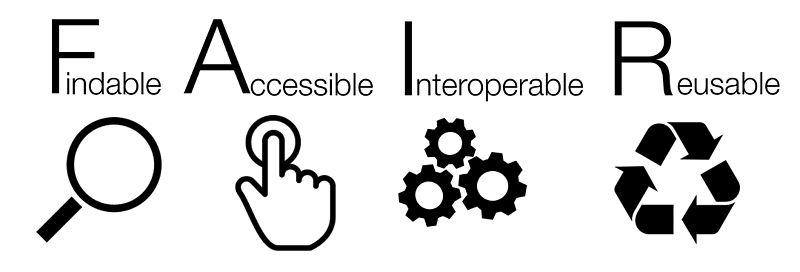
Researchers can use Hanken's research data management flowcharts and stages to complete different RDM tasks. Note that there are two different data management processes with different instructions for
| Review the minimum requirements and checklists on Hanken's page Data management and ethics for researchers (login required) for data protection measures and ethical considerations. |
For the open accessibility of research data, it is important to do the following:
More information on Hanken's LibGuide on Research data management (RDM).


Pictures: SciELO in Perspective, Wikimedia Commons.
Hanken adheres to responsible data management practices and ensures that management and sharing of research data are in accordance with relevant legislation and research integrity. Openness and good management of research data support the key goals of research quality and impact. The FAIR data principles give guidance on how to make research data truly open and reusable.
The goal of Hanken’s guidelines on open data is to make more of the research data produced at Hanken publicly available. For this purpose, Hanken recommends researchers to use Fairdata Qvain metadata tool [1] to describe and publish (meta)data of the research data, and to archive research data in a national or international data repository. If the research data cannot be published and archived because, e.g., the data contain personal information, sensitive personal data or confidential data, it is often possible to open and publish the metadata of the research data and provide other researchers with the opportunity to access the data through a separate agreement.
Research datasets are registered in Haris with the persistent identifiers (e.g., DOI and URN) for the (meta)data, and linked to research publications, methods, and projects when possible.
Data management plans (DMPs) are drawn up as part of quality management for research projects. Researchers write a DMP at the planning stage of the research project and update it as the research evolves. A DMP is a formal and dynamic document that specifies how the research data are handled during and after a research project and identifies the key actions for ethical and legal compliance and FAIR data production. Researchers can use Hanken’s DMP template or other public DMP templates (with Hanken's DMP guidance integrated) in DMPTuuli to write and update a DMP. See DMPTuuli with Hanken's DMP guidance and DMP template in the LibGuide on Research data management (RDM).
For the secure storage and backup of active research data during usage, researchers are encouraged to use data storage services provided by Hanken (including the researcher’s own account on the Hanken network H:\, Microsoft Office365 applications (e.g., OneDrive for Business), Webropol, and SPSS) and services provided by CSC (including IDA which is also for data archival).
It is advisable to conclude agreements on data ownership, rights of use and other intellectual property rights (IPRs) before commencing research activities in a research group. Researchers choose the degree of openness of research data which may be restricted and vary for many reasons. Creative Commons CC BY license is also recommended for published datasets when possible.
Hanken offers guidance, training and services to ensure effective and responsible research data management as an integral part and essential requirement of good scientific practices and research skills.
[1] The Qvain metadata tool is offered by the Ministry of Education and Culture and maintained by CSC. It makes describing and publishing research data effortless for researchers and ensures that data are richly and systematically documented and properly managed in line with the FAIR data principles. The Fairdata services are integrated with the research.fi, and metadata published through Qvain are automatically transferred to and displayed on research.fi. Other Fairdata services for data storage and archival (IDA), dataset dissemination and retrieval (Etsin), as well as long-term digital preservation of research data (DPS) are all recommended.
Research methods, as well as research publications and research data, are recognized as independent research outputs, and support the overall research quality and impact. Research methods should always be communicated at a sufficient level of detail and completeness to evaluate research methodologies and verify research results. Responsible management of research methods is part of good research practices and includes documentation that supports the ability to trace all relevant methodological steps. This allows the critical evaluation of all relevant methodological choices and are necessary for the transparency and reproducibility of the research.
Shared methods can take many forms, for example, study designs, protocols, source code, and algorithms. The FAIR principles apply also to open research methods when appropriate. Researchers can use the repositories that have been specifically intended for research methods including Open Science Framework (OSF) and digital repositories for data processing and software packages such as GitHub and Zenodo, and enter the link obtained from the repositories in Haris.
Hanken encourages researchers to open up the research process as early and widely as possible, and not to limit openness more than necessary. Early dissemination can help researchers establish priorities and receive timely feedback to improve the work, thus increasing the overall research quality and impact.
For example, preregistration describes the research plan in an open registry such as OSF. This helps to distinguish exploratory hypothesis-generating research from confirmatory hypothesis testing. Preregistration makes available the research hypothesis, study design, and planned analysis before research data are collected. Registered reports are research articles that are peer-reviewed and published in two stages: The study design and analysis plan including hypothesis and methodology undergo the first round of peer-review of the quality and suitability of the research question and protocol on, for example, OSF. If accepted, research protocols are preregistered, and the final research article is provisionally accepted for publication. After the research is conducted, an article containing the results and discussion as well as any changes is submitted and undergoes the second round of peer-reviewing.
Hanken develops guidance, services, and training for open research methods in line with national and international recommendations and guidelines to support the openness of methods in routine research practices.